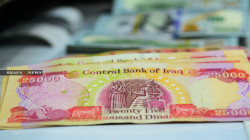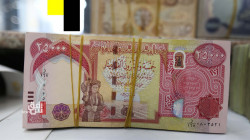Controversial bank loans: "The devil lies in the details"

Shafaq News / Different segments of society seek government and private bank loans for various reasons, including construction, start-ups, car purchases, and marriage loans.
However, citizens have been complaining about this new "condition" they must comply with to receive a loan: they must provide a percentage of funds to employees.
While economists criticized bank procedures, two government banks denied the accusations of "administrative corruption".
Many citizens described what banks are doing now to grant some loans to employees and citizens as taking advantage of the borrower's situation.
"The process of obtaining a loan is very difficult; although the application is through online links, what follows is a long procedure that makes those requesting the loan submit to any financial demands to speed it up," Huda Mohammed said, adding that she gave five million dinars to a transactional tracker, who in turn agreed with employees of one of the banks from which she wanted the loan.
"The lack of accountability and serious oversight in those banks causes some employees to demand money without fear," she continued, "our refusal to grant the agreed amount means saying goodbye to the loan."
"Banks' announcements, particularly government ones, of providing loans to citizens, is nothing but a propaganda for fraud because of the high interest they impose," Raad al-Khafaji told Shafaq News Agency, adding, "The repayment of a 15 million dinar loan with interest over six years amounts to more than 22 million dinars."
"Citizens who apply for loans of up to 100 million dinars due to an urgent need to purchase a house or for construction are frequently blackmailed by some employees who request up to 10 million dinars," al-Khafaji added.
Iraq is the worst among countries..
"The loans granted by different banks vary depending on the bank, but the worst part is the repayment process in government banks.
The interest is high, and the first installment is deducted from the loan value," economist Dhurgham Mohammed Ali told Shafaq News Agency.
"Guarantees and procedures are difficult to implement, and meeting interest is unfair because its rate never changes until the end of the payment," he added.
"Loans from private banks vary and are lower than those provided by government banks because they have less than 15% of bank deposits," Mohammed Ali explained, "The credit granting procedure is the worst in the world, as it is customary that banks promote their banking services, and it not the customer who begs banks to borrow."
He also emphasized the spread of a new phenomenon, namely, creating obstacles to loan applicants, whether citizens or employees, in order to force them to pay a certain amount of money to obtain the loan, "This phenomenon has spread to most government banks without any accountability or scrutiny, even though it has become common and known to all."
Poor oversight..
"Such corruption cases result from government banks' lax control over their employees, or even other regulatory services such as the Ministry of Finance or the Integrity Commission," financial expert Munir al-Hilali stated.
"The citizens suffer greatly when attempting to obtain loans, particularly large ones, due to the instructions and procedures they must go through."
Al-Rafidain bank..
Al-Rafidain Bank, for its part, denied having any transactional trackers or employees who require sums of money from citizens to grant them loans.
"Giving money to people who work at the bank or are in a position to facilitate the loan is untrue. This is considered fraud, and the loan is automatically denied if it occurs," said a manager at a branch of al-Rafidain Bank who preferred anonymity.
He also confirmed, "The bank holds all those who do so accountable. There are oversight bodies in the public administration that follow up, with penalties that reach dismissal and prosecution."
"The banks' tightening of loan-granting instructions is due to one reason: these amounts represent the bank's capital. Therefore, citizens are expected to provide guarantees for repaying the loan plus interest; otherwise, what's the point of making a loan that can't be recovered?"
"Al-Rafidain Bank has begun to ease restrictions by using MasterCards, particularly for citizens whose salaries are directly deposited in the bank," he continued.
Al-Rasheed bank..
Al-Rasheed Bank, for its part, explained that applications for such loans are online.
"Some fictitious sites that we have already mentioned are exploiting citizens with the possibility of obtaining a loan in exchange for money," an official from Al-Rasheed Bank's media office told Shafaq News Agency, adding that "the bank has nothing to do with those swindlers."
"The procedure begins with the citizen applying for a loan via a link. Then, after a basic audit, they are notified via an SMS, and the amount is deposited in their MasterCard. So this whole story of requiring sums to provide a loan is unfounded, "explained the official, who preferred anonymity.
Several government banks, particularly al-Rafidain and Al-Rasheed, compete to provide various loans based on procedures and instructions that can be strict at times, while some citizens have difficulty obtaining them compared to other countries where such loans are frequently optimally investment-oriented.





